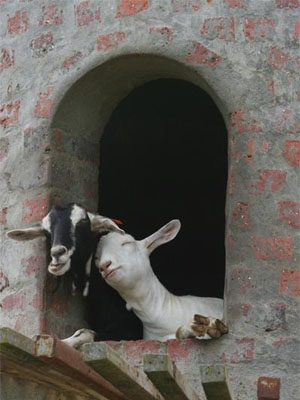Miscellaneous
 One of the greatest frustrations of this time is its paradoxical nature. And one of the greatest paradoxes is the concept of things hiding in plain sight.
One of the greatest frustrations of this time is its paradoxical nature. And one of the greatest paradoxes is the concept of things hiding in plain sight.
Like sliding your glasses up onto your head, and then spending a half-hour looking for them, the situation is frustrating because its self-referential nature makes it impossible to see the self objectively.
In the same way, things that our minds do not find convenient to measure are forgotten or lost. Our minds like tangible things with bold lines separating them from other things. We do not like logical containers which are messy, overlapping or obscure.
And when we can’t have what we want, we project it, using ourselves as the yardstick of course.
Our greatest blindness concerns details. If you go into any house, there is a drawer whose purpose no one can define. Basically, anything that doesn’t have another place because of what type of thing it is, goes into this drawer. It’s the miscellaneous drawer.
Similarly, in many filing systems, the miscellaneous area is the biggest. In much of our thinking about life, we look toward big points and write off the rest as miscellany. Miscellaneous details may in fact be the majority of what we encounter.
However, we can’t measure them, and our bread and butter as brave moderns is the ability to test and measure. How do you measure a tiny change in someone’s attitude, for example? When 300 of them have occurred, we can measure that the person is happier, but we can’t find the cause, so we assign a cause. And thus miss the point.
The point is that no detail exists independent of anything else. Plato was right; all things on this earth exist because somewhere a cause set them in motion. Not only that, but every detail has effects on us, even if administered in small doses.
If our car door is badly designed and sticks, that’s another bit of frustration. A cruel co-worker is another bit. A balky computer, another bit. Frustration builds. The attitude that we end up with is hostile and grudging, cynical and revengeful.
If we had a philosopher-king, he might seem insane to the ordinary businesspeople. He would hold up car production to get the doors to stop sticking, spend centuries of manpower on making the computer work better, and he’d fire the irritating coworkers or transfer them to Alaska.
The point is that to a philosopher-king, no detail exists without an effect, so every detail is important. The goal is to make people who are content and have a positive outlook. Thus, frustrations, irritations, injustices, etc. — no matter how small — must be eliminated whenever possible.
Miscellany triumphs when order is imposed on it. Order consists of making sure it has a purpose or is removed. That which does not serve a purpose, which is one of the many steps toward an ongoing goal like “have a great civilization,” can be cast aside — and should be.
The new golden rule to life should be this: reward the good, destroy the bad, ignore the simply mediocre.
But something in our human animal fears that. If the bad is destroyed, a social standard is established. That means we aren’t “free.” We can’t fully express ourselves. We are oppressed. Or are we? What did we need to do that we now cannot?
And conversely, what did we want to do — that we shouldn’t do, because it will harm us — will we be constrained from doing, forcing us to adapt to a healthier way of life?
As I watch this society grind itself down into paste, and the people grow more anonymous and pleasant but less capable of thought every day, I think about the triumph of the miscellany. It is the largest category, miscellaneous. It will win no matter what we do.
The question is whether we use our organizational skills to make sure that when it wins, we win, or whether we ignore it so we can maintain the pretense of total autonomy, and thus ensure that entropy will stalk our shadows and drive us into oblivion.
Tags: crowdism









